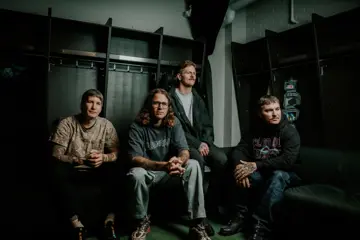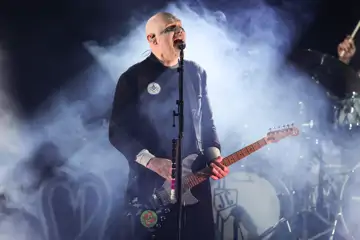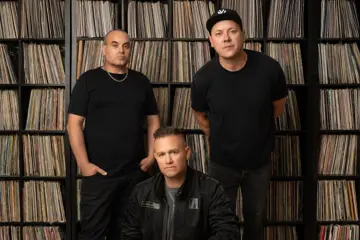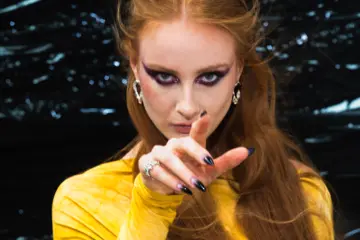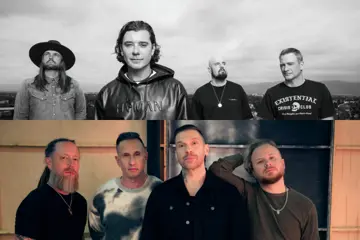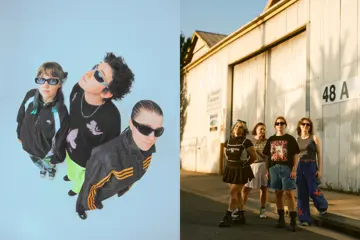GREEN BOOK
★★
Once upon a time, America was racist. The South was segregated. It was a form of apartheid, ugly and hateful; peoples and cities divided along racial lines, society verily scarred. But then Viggo Mortensen got a job driving Mahershala Ali across the South. One was a rough-and-tumble Italian-American from the Bronx, the other a high-society classical pianist with multiple doctorates and haughty airs. They were the Original Odd Couple! But, as these two stereotypes swapped comic banter, cultural observations, and lines resembling greeting-card homilies, chasms were crossed, gaps were bridged, divides obliterated. Across an eight-week tour, and 130 minutes, everything changed. Then, there was no more racism in America.
So goes Green Book, a twee, reductive, feelgood buddy comedy that is this year’s what-the-fuck-are-they-thinking? Oscars contender. Critics of the film have mocked it for being a knockabout Driving Miss Daisy redux, three decades on. And, somehow, the Academy has swallowed it hook, line, and sinker: Green Book receiving five nominations.
One of those nominations, amazingly, comes for Mortensen’s sketch-comedy-worthy leading-man work, in which he plays an old-timey ethnic caricature. A more-familiar Oscars narrative comes with the presence of director Peter Farrelly. He didn’t get nominated for Best Director, but did share in a Best Screenplay gong, and has helmed a film nominated for Best Picture.
Here, the award-show narrative is one of the reformed comedy director; an almost-evangelical tale of youthful tomfoolery, paid penance, and artistic ‘maturation’. Farrelly and his brother, Bobby, started out stupid: their first film was Dumb And Dumber, and from there their career included Kingpin, There’s Something About Mary, Shallow Hal, Stuck On You, The Three Stooges, and Dumb And Dumber To. Having shovelled so much shit into the multiplexes, there’s something supposedly ‘noble’ about Farrelly’s mild turn towards socially-conscious filmmaking.
Don't miss a beat with our FREE daily newsletter
But, in reality, Green Book is a comedy just as lowbrow as any of his others. Farrelly hasn’t opted for radical reinvention, instead he’s just peddling a slightly different variety of pre-formatted Hollywood product. Green Book is safe, non-threatening, audience-flattering, and history-reimagining. Here, the Jim Crow South doesn’t seem so bad, not when you’re on a roadtrip in a roadtrip-movie. Where the lessons you learned along the way weren’t just about America, but yourselves. And where the treasure you find, at the end, is friendship.
It’s hokey as fuck, and feels like a fanciful retreat from reality. Here, in the dark, dystopian present, journey into vintage-motor-vehicled past, with a film whose reassuring escapism is the fantasy that racism in America ended half a century ago.
THE MULE
★★
Clint Eastwood is 88 years old. Given his directorial pace, he could still have many movies left to turn out. But, if we’re to take each Eastwood film as perhaps his last, The Mule would be quite an apt final salvo. As director/star, Eastwood struts in front of his own camera, large and in charge and in every scene, an old-fashioned hero even into — if not especially because of — his advance years. Here’s the macho pin-up of the 'greatest generation', still acting like the biggest dick in the room, sending a great big fuck you what Eastwood himself refers to as the "pussy generation".
These are things Eastwood says in The Mule: “Damn internet, it ruins everything!”; “That’s the trouble with your generation, you can’t open a fruitbox without calling the internet!”; “It’d work a lot better if you got that damn phone out of your hand?”; “You guys and your generation... don’t you live life outside of your phone?”
But, as well as dispensing life lessons and/or crotchety indignation to young people, Eastwood’s character learns some things, as well; makes good, late in the game, on his manly failings. Those failings are the standard stuff of gruff old codgers: he was never around for his wife and kids, prioritising work over family. His daughter hates him. His ex-wife finds him incredulous. And, so, with third-act convenience, our hero pays a mild penance, winning back the love of all before going out with a bang.
Which is all to say: this is a movie — based, I’m guessing very tenuously, on a true story — about a 90-year-old Middle American who, following the closure of the flower-farm he’s spent a lifetime tending to, gets a new job: ferrying cocaine cross-country for the cartel. In turn, what happens is a kind of ongoing road-movie, with Eastwood coming across people who help broaden his worldview.
On his tail are a pair of narcotic agents played by Bradley Cooper and Michael Peña, who get plenty of comic banter but otherwise serve entirely-functional roles. There’s even a very-contrived scene where Cooper and Eastwood cross paths in a diner, talk about life as two manly men on different sides of the law. It’s one of many moments, herein, comparable to Robert Redford’s recent swansong in The Old Man & The Gun. But where that film had abundant charm — in its leading man, in its gentlemanly friendliness, in David Lowery’s directorial vision — The Mule has none.
FYRE: THE GREATEST PARTY THAT NEVER HAPPENED
★★★1/2
It was one of the greatest moments in internet schadenfreude: a “luxury” music festival in the Bahamas, promoted by Ja Rule, with a flown-in crowd full of Instagram influencers, turns into a hellish Lord Of The Flies horrorshow. Fyre Festival was billed as the most exclusive festival the world has ever seen, only it delivered no performers, shanty-town accommodation, poor access to sanitation, and a general feeling of everyone-for-themselves looting. People who arrive on the second day are kept locked in the Exuma airport without food or water. Those on the ground receive a sandwich of plain bread with a single slice of processed cheese; a shot seen around the world. In response, those following along at home, watching the disaster unfold, have a field day. The memes are amazing, the jokes all too easy. It’s the perfect symbol of late-capitalist decadence, a shitshow made all the funnier by the involvement of Ja Rule.
That the fest found infamy on the internet, and this all played out via the online feed, is all too symbolic. The festival found traction by dint of its online campaign, which involved supermodels, influencers, Instagram, Kendall Jenner being paid $250,000, and peddled dreams of prime photogenic content. Here, the collective delusion of a social-media feed was made manifest, but its glossy façade was soon revealed as a Potemkin village.
Here, ace documentarian Chris Smith — who, from American Movie through The Yes Men, Collapse, and Jim & Andy: The Great Beyond, has chronicled delusional dreamers, hucksters, and conspiracy theorists — sorts through the ashes of Fyre; seeks to find answers as to how something could go so wrong. In short: ego, greed, delusion, pathological lying, branding.
“We’re selling a pipe-dream,” offer both of the founders, Ja Rule and Billy McFarland, in one meeting. It’s unclear if they don’t know the actual meaning of the term, or if they’re utterly shameless in their shysterdom. The former is macho, aggressive, full of horrifying entitlement. The latter is recurringly called “charismatic” by the co-workers who appear as talking heads, but that charisma is told to us second-hand, and not evident in the video. There, smilin’ Billy seems like the worst human imaginable: a backhatting, jetski-riding, motorbiking, wealth-flaunting, neo-colonialist dude-bro out to make cash via whatever bullshit he can shill. The doc’s amazing turn comes in the final act, in the post-Fyre wash-up, where Billy may be facing fraud charges, but doesn’t chastise him one bit; there, always, more ‘millennial’ scams to be had.
FREE SOLO
★★★1/2
It’s not a hard film to sell: in 2017, rock climber Alex Honnold scaled El Capitan — 3000 feet of sheer rockface in Yosemite National Park — in a ‘free solo’ climb. Meaning: without ropes. Meaning: this was one man scrambling up a vertical slab of rock, where one slip would lead him to plummeting to his death. This ascent was chronicled — for preparatory years in advance, then on the morning in question — by directors Elizabeth Chai Vasarhelyi and Jimmy Chin, old friends of Honnold’s who’d been welcomed into his world. They set up climbers with cameras and remote-rigs on the mountain. A helicopter hovered above, capturing the action. Watching Free Solo, you’re right there at those wild heights, witnessing the vertiginous drop, seeing just how thin the line between life and death; Honnhold’s fate in the balance with every hand-hold, this a literal cliffhanger. Oh, and you can watch it all on an iMAX screen.
Given Free Solo has been beloved, widely-praised, and nominated for an Oscar, you can be pretty sure that Honnold makes it. Triumphs of the human spirit are an easy sell. Snuff movies, on the other hand, are a less-popular proposition. But the central question of this whole production — what if he dies? — lingers throughout Free Solo. Given the proximity of the filmmakers to both climber and his endeavour, there’s never any attempt to present this as some distant, observationist, ‘objective’ documentary. Crew are often present in the frame, or heard conversing with their on-camera subject. And they, like everyone else in Honnold’s life, questions why he wants to do this.
The film is a study in the psychology of its subject, of free climbers, and of people who need to push themselves ever-further to feel thrills. At one point, climber Tommy Caldwell — who was recently the subject of a very-related documentary, The Dawn Wall — calmly offers that, of all his friends, Honnold is the most likely to die. In Free Solo, we’re invited to think about this; to contemplate not just our hero’s proximity to death, but our own. His eventual triumph is, literally, death-defying, a victory for man in the face of oblivion. That’s why Free Solo has struck such a chord with viewers. Well, that and its vividly-cinematic shots of a tiny figure ascending a towering wall, battling the abyss.
LET THE SUNSHINE IN
★★★
A ‘Claire Denis romantic comedy starring Juliette Binoche’ is, it turns out, a better unbelievable daydream than a real film. Binoche is one of the greatest actors in the world; this decade alone has brought Certified Copy, Camille Claudel 1915, and Clouds Of Sils Maria. Denis is a bulletproof auteur: Beau Travail, Trouble Every Day, and White Material are unalloyed classics, and any film-nerd worth their salt has at least one obscure Denis flick they're ready to go into bat for (ask me for my No Fear, No Die takes!). The idea of Denis bringing her particular directorial traits — sensorial tactility, narrative inscrutability, thematic explorations of post-colonial French identity — to one of cinema’s more-maligned genres sounds wild, but the ultimately result is pretty mild.
Let The Sunshine In does feature numerous formalist transgressions against the regular three-act structure of the rom-com; its episodic, scattershot plot not only avoiding the regular meet-cute/love-montage/falling-out/public-reconciliation beats of the genre, but dancing to its own narrative drum. When Gérard Depardieu and Valeria Bruni Tedeschi arrive deep into the final act, five minutes from the finish, as two transient characters we never really get to know, it’s somewhere between stunt-casting and genuinely-disorienting; two of the most famous humans in France playing oddball bit-parts that come close to derailing the narrative.
The narrative, as it is, comes and goes; as mercurial, hard-to-predict, and exasperating as dating itself. Binoche plays a painter (which she is in real life), who’s introduced as being “not in a good place right now”, though it seems likely she’s been in that place for quite a while. She’s a divorcée in her 50s, struggling with the feeling that the best days of her life are behind her. She’s trying to find reassurance via romance, but her experiences are variations on unsatisfying or horrifying. It’s a film about dating, no matter the age: our heroine navigating a host of various men who, whether young or old, hot or not, wealthy or struggling, all possess bountiful ego, wild male entitlement, and an inability to think much beyond their own desires. Out of this parade of possible, terrible matches, the best is that most Denis of choices: Alex Descas, an actor appearing in his ninth Denis movie.



